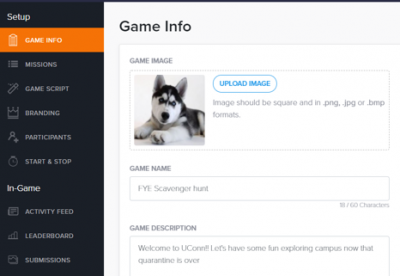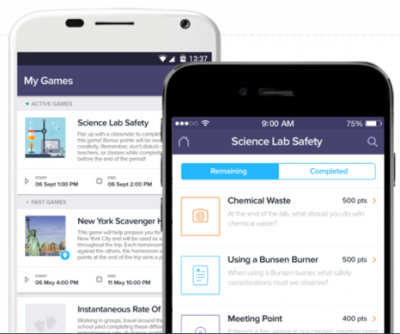A scavenger hunt can serve as a means to engage students in or out of the classroom. Scavenger hunts utilize the theory of game-based learning to:
- Develop critical-thinking skills;
- Review course content;
- Create familiarity with resources on campus and location of services; and/or
- Develop team-building skills.
Scavenger hunts can be utilized in classes, with organizations, within departments, or even university-wide.
While scavenger hunts can be accomplished low-tech, including paper-based, one tech-based option is the use of GooseChase. The instructor creates the hunt using GooseChase’s website and students participate in the hunt using an app on their mobile device. The missions can be set up for participants to submit text responses, photos, videos, or GPS location check-ins.
A free educator’s version is available for smaller groups but a paid version is necessary for larger groups. While UConn does not provide paid versions of the software, departments, programs, or individuals can purchase the software. Be sure to use the educator site for better pricing: www.goosechase.com/edu/


Sample missions:
First Year Experience: https://docs.google.com/spreadsheets/d/1ZtdGUjN4_X_oo_aGOSn-LXwkVu-e-NFiyEVNrp-PW9g/edit#gid=1203650713
In-person Storrs-based university-wide Husky Hunt: https://docs.google.com/spreadsheets/d/1igOC0Th2kN2RaMpRuvVi-3_jwrCGTZQz0QrdFzJW16Q/edit#gid=1911926580
Virtual university-wide Husky Hunt: https://docs.google.com/spreadsheets/d/12zgl8cVHYoJgL8TkzgYBfOtYsV2AQzwClimfMt4-lwI/edit#gid=1949929768
For support using GooseChase:
Option 1: GooseChase offers a chat feature on their website. Look for the blue chat icon in the lower right corner of pages.
Option 2: Additional support resources can be found at: https://support.goosechase.com/en/

Scavenger hunts in higher education research articles:
Ramsey U. Americans with disabilities act scavenger hunt. J Legal Studies Educ 2018; 35(1): 143-164